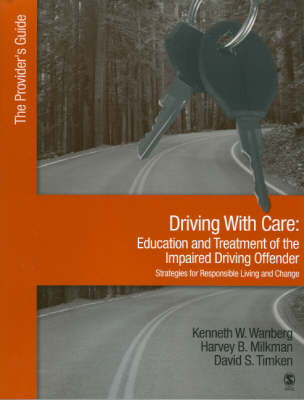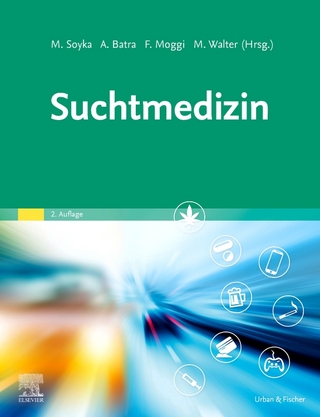
Driving With Care:Education and Treatment of the Impaired Driving Offender-Strategies for Responsible Living
SAGE Publications Inc (Verlag)
978-1-4129-0596-1 (ISBN)
This three-level education / treatment program targets judicial clients who have been convicted of driving under the influence of alcohol and drugs and includes the following components:
Provider′s Guide: Offers guidelines for developing individualized treatment plans and implementing appropriate education and treatment curriculum protocol
Participant′s Workbook: Level I Education: Six-session, 12-hour DWI education program designed for first-time offenders
Participant′s Workbook: Level II Therapy: 21-session, 42-hour program designed for clients with higher levels of AOD disruption and psychosocial problems who need intervention over longer periods of time
Participant′s Workbook: Level II Education: 12-session, 24-hour education program for impaired driving offenders who have at least minimal indicators of past problems associated with AOD use or misuse and whose arrest blood-alcohol-content was at the impaired driving level
SAGE offers treatment and training programs for mental health providers that you can easily incorporate into your existing programs.
What Do Mental Health Providers Get With the DWC Program?
Comprehensive overview of cognitive behavioral treatment for impaired driving offenders
Thorough review of theory and practice related to client evaluation
Legal and cultural considerations
Operational procedures for assessing and matching DWI offenders to appropriate levels of education and treatment services
Guidelines for developing individualized treatment plans
What Will DWC Participants Learn?
Change in behavior is made by changing their thoughts, attitudes and beliefs
How to take an active part in the process with exercises, worksheets and group discussion
Self-control over thinking and actions, responsible behavior towards others and the community
Kenneth W. Wanberg, ThD, PhD, is a licensed psychologist in the State of Colorado and Director of the Center for Addictions Research and Evaluation, Inc. Harvey B. Milkman, PhD received his baccalaureate degree from City College of New York and his doctorate from Michigan State University. He is currently professor of psychology at Metropolitan State College of Denver. His doctoral research was conducted with William Frosch, MD, at Bellevue Psychiatric Hospital in New York City, on the User’s Drug of Choice. From 1980–1981, he completed a sabbatical exploration of addictive behavior in Africa, India, and Southeast Asia; in 1985 he was recipient of a Fulbright-Hays Lectureship award at the National University of Malaysia. He has represented the United States Information Agency as a consultant and featured speaker in Australia, Brazil, Iceland, The Netherlands, Peru, Turkey, and Yugoslavia. He is principle author with Stanley Sunderwirth of “The Chemistry of Craving,” and author of “Better than Dope,” featured articles in Psychology Today, October, 1983 and April, 2001 respectively. From September 1992–June 2002, he was author, principal investigator, and director of Project Self-Discovery: Artistic Alternatives for High-Risk Youth, a national demonstration model funded by The Center for Substance Abuse Prevention and the Edward Byrne Foundation. David S. Timken, Ph.D. has over 45 years experience in the traffic safety field. His specialty areas include the assessment , education and treatment of DWI offenders and he provides consultation, research and training. He is widely published and has presented numerous papers internationally as well as throughout the U.S. He holds membership in a number of professional organizations including the International Council of Alcohol, Drugs and Traffic Safety. Dr. Timken maintains a small clinical consultation practice.
Section I: Historical Perspective
Chapter 1: Scope of the Problem
Chapter 2: History of Impaired DWI Countermeasures and Legislation
Chapter 3: Causative and Interactive Factors of Impaired Driving
Chapter 4: Characteristics of the Driving While Impaired Offender
Chapter 5: Underaged Impaired Drivers
Chapter 6: The Hard-Core Impaired Driver and Repeat Offender
Chapter 7: Perspectives on a Process and Convergent Validation Model for the Assessment of Impaired Driving Offender
Chapter 8: Counter Measures, Intervention and Treatment Approaches and Outcomes
Chapter 9: Overview of Cognitive Behavioral Theory
Chapter 10: Issues of Culture and Diversity Related to Impaired Driving and its Intervention: Enhancing Provider Cultural Competence
Section II: The Education and Treatment Platform
Chapter 11: Conceptual Framework for the Education and Treatment of the Impaired Driving Offender
Chapter 12: Characteristics of the Effective DWI Provider and the Client-Provider Relationship
Chapter 13: Assessment of the Driving while Impaired Offender
Chapter 14: Operational Guidelines and Procedures for Driving with Care Education and Treatment Protocols
Section III: The Education and Treatment Curriculums
Introduction to the Education and Treatment Service Protocols
Overview
Structure of the Curriculum Manual (Section III)
Screeing of DWIO Clients into the Three Levels of Service
Introducing the Participant′s Workbook
The Themes of the Education and Treatment Curriculum
Developing a Working Relationship with Clients
Resources for the Development of the Three Service Protocols
Alcohol, Other Drugs and Driving Safety Education: Level I Education
Overview and Introduction to Level I Education
Specific Goals and Objectives of Level I Education
Content Presentation and Delivery Strategies
Provider Skills and Service Strategies Needed for Level I Education
Completing Requirements and Expectations of Client
Driving with Care Inventory (DWCI)
Intake, Assessment and Orientation
Outline of Program Lessons
Lesson 1 Program Orientation: Developing a Working Relationship
Lesson 2 The Laws and Beyond the Laws
Lesson 3 Changing Our Thoughts, Beliefs and Actions: Learning Self-Control and Driving with Care
Lesson 4 Alcohol and Other Drugs: How Do the Facts and Ideas about Alcohol and Other Drugs Fit You?
Lesson 5 Understanding Alcohol and Other Drug (AOD) Use and Problem Outcome Patters: How Do They Fit You?
Lesson 6 Preventing Recidivism and Relapse
Summary of Curriculum Guide for Level I Education
Alcohol, Other Drugs and Driving Safety Education: Level II Education
Overview and Introduction to Level II Education
Specific Goals and Objectives of Level II Education
Delivery Strategies and Content Presentation
Provider Skills and Service Strategies Needed for Level II Education and Therapy
Completion Requirements and Expectations of Clients
Intake and Assessment
Driving with Care Inventory (DWCI)
Outline of Program Lessons
Meeting Client Therapeutic Needs During Level II Education
Lesson 1 Program Orientation: Developing a Working Relationship
Lesson 2 The Laws and Beyond the Laws
Lesson 3 How Thinking, Attitudes and Beliefs Control Our Actions
Lesson 4 How Behavior is Learned and Changed: Learning Self-Control and Driving with Care
Lesson 5 Alcohol and Other Drugs: How Do the Facts and Ideas about Alcohol and Other Drugs Fit You?
Lesson 6: Alcohol and Other Drug (AOD) Use Patters: How Do They Fit You?
Lesson 7: Problem Outcomes of Alcohol and Other Drug Use: Patterns of Misuse and Abuse - How Do They Fit You?
Lesson 8 Pathways to Relapse and Recidivism
Lesson 9 Process and Steps to Preventing Recidivism
Lesson 10 Preventing Relapse and Recidivism: Building Personal Values and Prosocial Attitudes and Behaviors and Driving with Care
Lesson 11 Preventing Relapse and Recidivism: Managing Stress and Emotions
Lesson 12 Preventing Relapse and Recidivism: Building Healthy Family, Intimate and Social Relationships
Program Closure: Closing the Program - Review and Reflection
Treatment of the Impaired Driving Offender: Level II Therapy
Overview and Introduction to Level II Therapy
Goals and Objectives of the Level II Treatment Protocol
Individualized Treatment Plan
Treatment Protocol Structure
Program Service Delivery Structure Options
Session Delivery Structure
Strategies for Session Content Presentation
Provider Service Deliver Skills Needed for Level II Therapy
Completion Requirements and Expectations of Clients
Intake and Assessment
Outline of DWC Therapy Sessions
Session 1 Introduction and Program Orientation I: Understanding and Engaging the Change Process
Session 2 Program Orientation II: In-Depth Assessment and Targets and Tools for Change - Your Master Profile and Your Master Assessment Plan
Session 3 Pathways to Alcohol and Other Drug Use Outcomes and Addiction
Session 4 Reviewing Your Program Outcome Symptoms and Patterns
Session 5 Managing AOD Cravings and Urges
Session 6 Skills in Self-Control: Recognizing and Changing Negative Thoughts and Negative Thinking
Session 7 Skills in Self-Control: Recognizing and Changing Errors in Thinking
Session 8 Skills in Self-Control: Managing Stress and Emotions
Session 9 Skills in Self-Control: Recognizing and Managing Anger
Session 10 Social and Relationship Skill Building: Learning Communication Tools and Skills
Session 11 Social and Relationship Skills Building: Starting a Conversation
Session 12 Social and Relationship Skills Building: Giving and Receiving Positive Reinforcement - Praise
Session 13 Social and Relationship Skills Building: Learning Problem Solving
Session 14 Social and Relationship Skills Building: Assertiveness Skill Development
Session 15 Social and Relationship Skills Building: Looking for High Risk Situations for Alcohol Use and Learning and Practicing Refusal Skills
Session 16 Social and Relationship Skills Building: Developing and Keeping Intimate and Close Rlationships
Session 17 Strengthening Recidivism and Relapse Prevention Skills
Session 18 Relapse and Recidivism Prevention: Your Relapse and Recidivism Prevention Plan and Lifestyle Balance
Session 19 Community Responsibility Skils: Strengthening Character and Prosocial Values and Behavior
Session 20 Community Responsibility Skills: Understanding and Practicing Empathy
Session 21 Community Responsibility Skills: Resolving Conflicts and Negotiation Skill Development
Extended DWC Therapy Sessions: Reflection and Review and the Therapy Projects
Project 1 Healthy Play and Leisure Time
Project 2 Does Your Work Match Your Job?
Project 3 Learning to Search for a Job
Project 4 Learning to Relax: Your Daily Relaxation Plan
Project 5 Preventing Relapse - What is Working Best?
Project 6 Preventing Recidivism - What is Working Best?
Project 7 Skills in Time Management and Completing Tasks
Project 8 Getting Support from Groups and Others
Project 9 Giving Support - Mentoring and Role Modeling
Project 10 Sharing Your Future Biography
| Erscheint lt. Verlag | 9.3.2005 |
|---|---|
| Verlagsort | Thousand Oaks |
| Sprache | englisch |
| Maße | 215 x 279 mm |
| Gewicht | 990 g |
| Themenwelt | Geisteswissenschaften ► Psychologie |
| Medizin / Pharmazie ► Medizinische Fachgebiete ► Suchtkrankheiten | |
| Recht / Steuern ► Strafrecht ► Kriminologie | |
| ISBN-10 | 1-4129-0596-6 / 1412905966 |
| ISBN-13 | 978-1-4129-0596-1 / 9781412905961 |
| Zustand | Neuware |
| Informationen gemäß Produktsicherheitsverordnung (GPSR) | |
| Haben Sie eine Frage zum Produkt? |
aus dem Bereich



